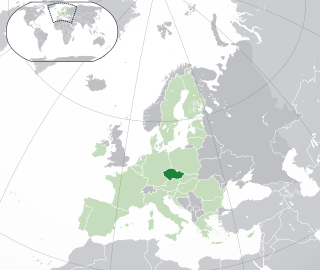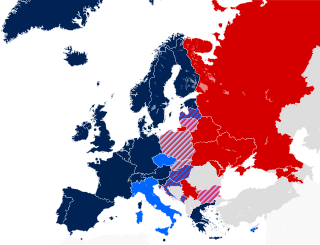
A civil union is a legally recognized arrangement similar to marriage, created primarily as a means to provide recognition in law for same-sex couples. Civil unions grant some or all of the rights of marriage.
Same-sex adoption is the adoption of children by same-sex couples. It may take the form of a joint adoption by the couple, or of the adoption by one partner of the other's biological child.
Romania does not allow same-sex marriage or civil unions. In June 2018, the European Court of Justice ruled that under certain circumstances same-sex spouses of European Union citizens should be granted a right of residency in Romania. The Constitution of Romania does not define marriage directly, but Article 48 of the Constitution defines marriages between "spouses" as the foundation of the family.
Same-sex marriage has been legal in Slovenia since 9 July 2022 in accordance with a ruling from the Constitutional Court of Slovenia. The court ruled that the ban on same-sex marriages violated the Constitution of Slovenia and gave the Parliament six months to amend the law to align with the ruling, although the decision took effect immediately after publication. The National Assembly passed legislation to align with the court ruling on 4 October 2022, which was vetoed by the National Council one week later, but the veto was then overridden by the National Assembly on 18 October 2022.
Same-sex marriage has been legal in Luxembourg since 1 January 2015. A bill for the legalisation of same-sex marriages was enacted by the Chamber of Deputies on 18 June 2014 and signed into law by Grand Duke Henri on 4 July. Luxembourg was the last Benelux country, the sixteenth country in the world, and the tenth in Europe to allow same-sex couples to marry nationwide. Partnerships have also been available in Luxembourg since November 2004.

Italy has recognised same-sex civil unions since 5 June 2016, providing same-sex couples with all of the legal protections enjoyed by opposite-sex married couples, excluding joint adoption rights. A bill to allow such unions, as well as gender-neutral domestic partnerships, was approved by the Senate on 25 February 2016 and the Chamber of Deputies on 11 May and signed into law by the Italian President on 20 May of the same year. The law was published in the official gazette the next day and took effect on 5 June 2016. Before this, several regions had supported a national law on civil unions and some municipalities passed laws providing for civil unions, though the rights conferred by these civil unions varied from place to place.

Lesbian, gay, bisexual, and transgender (LGBT) people in Slovakia face a multitude of legal and social challenges not experienced by non-LGBT residents.

Lesbian, gay, bisexual, and transgender (LGBT) people in the Czech Republic are granted some protections, but may still face legal difficulties not experienced by non-LGBT residents. In 2006, the country legalized registered partnerships for same-sex couples, and a bill legalizing same-sex marriage was being considered by the Parliament of the Czech Republic before its dissolution for the 2021 Czech legislative election, when it died in the committee stage.
This article contains a timeline of significant events regarding same-sex marriage and legal recognition of same-sex couples worldwide. It begins with the history of same-sex unions during ancient times, which consisted of unions ranging from informal and temporary relationships to highly ritualized unions, and continues to modern-day state-recognized same-sex marriage. Events concerning same-sex marriages becoming legal in a country or in a country's state are listed in bold.
This is a list of notable events in the history of LGBT rights that took place in the year 2006.
Same-sex marriage has been legal in Estonia since 1 January 2024. The government elected in the March 2023 election, led by Prime Minister Kaja Kallas and consisting of the Reform Party, the Social Democrats and Estonia 200, vowed to legalize same-sex marriage. Legislation to open marriage to same-sex couples was introduced to the Riigikogu in May 2023, and was approved in a final reading by 55 votes to 34 on 20 June. It was signed into law by President Alar Karis on 27 June, and took effect on 1 January 2024. Estonia was the first Baltic state, the twentieth country in Europe, and the 35th in the world to legalise same-sex marriage.

The legal status of same-sex marriage has changed in recent years in numerous jurisdictions around the world. The current trends and consensus of political authorities and religions throughout the world are summarized in this article.
Same-sex marriage has been legal in Chile since 10 March 2022. In June 2021, President Sebastián Piñera announced that his government would sponsor a bill to legalize same-sex marriage. The Senate of Chile passed the legislation on 21 July 2021, and the Chamber of Deputies gave its approval on 23 November 2021. Disagreements on some aspects of the bill led to the formation of a mixed commission to discuss it. Both chambers of the National Congress approved an identical version of the bill on 7 December 2021. President Piñera signed the legislation into law on 9 December, and it was published in the Diario Oficial de la República de Chile on 10 December. The law took effect 90 days later, with the first same-sex marriages taking place on 10 March 2022. Chile was the sixth country in South America and the 29th in the world to allow same-sex couples to marry.

Debate has occurred throughout Europe over proposals to legalise same-sex marriage as well as same-sex civil unions. Currently 33 of the 50 countries and the 8 dependent territories in Europe recognise some type of same-sex union, among them most members of the European Union (24/27). Nearly 43% of the European population lives in jurisdictions where same-sex marriage is legal.
Slovakia does not recognise same-sex marriage or civil unions. However, there is some limited legal recognition for unregistered cohabiting same-sex couples, notably with regard to inheritance rights. The Constitution of Slovakia has limited marriage to opposite-sex couples since 2014, and bills to allow same-sex civil partnerships have been introduced several times, most recently in 2023, but have all been rejected.
Serbia does not recognize any form of legal recognition for same-sex couples. Same-sex marriage is banned under the Constitution of Serbia adopted in 2006. However, there have been discussions in the National Assembly to legalize civil unions.

Same-sex marriage is legal in the following countries: Andorra, Argentina, Australia, Austria, Belgium, Brazil, Canada, Chile, Colombia, Costa Rica, Cuba, Denmark, Ecuador, Estonia, Finland, France, Germany, Greece, Iceland, Ireland, Luxembourg, Malta, Mexico, the Netherlands, New Zealand, Norway, Portugal, Slovenia, South Africa, Spain, Sweden, Switzerland, Taiwan, the United Kingdom, the United States, and Uruguay.
This is a list of notable events in the history of LGBT rights that took place in the year 2016.

Markéta Pekarová Adamová is a Czech politician who is the President of the Chamber of Deputies since 2021 and leader of TOP 09 since 2019. She has been a member of the Chamber of Deputies since 2013.
The recognition of same-sex unions varies by country.








